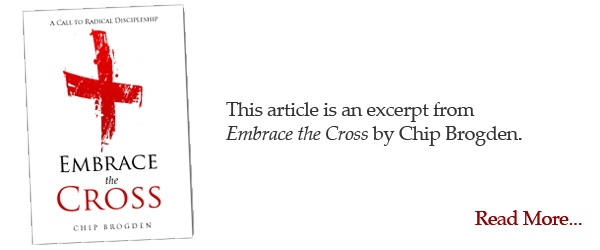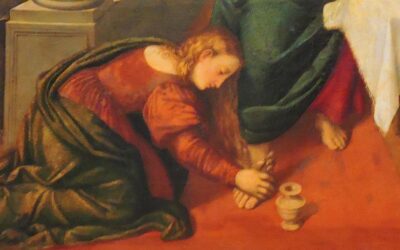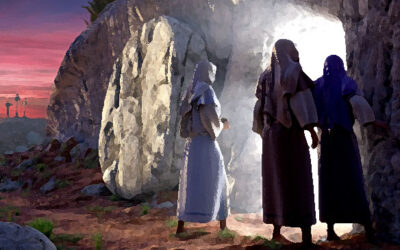If things go differently than what we expect then we are apt to become frustrated, angry, or upset. The greater the disparity between what we expect and what actually happens, the greater our discomfort. This shows that the difficulty is not in what we are experiencing, but in what we expect to experience.
The Lord Jesus is the most misunderstood Person of all. Millions of people expect something that He is not willing to provide, yet He offers every one of them something that they do not expect – or want. This seems to be the Lord’s way. A quick reading of the Gospels reveals just how little people understood Him. Even His own disciples had a hard time understanding Jesus. He would have shared much more with them, but they could not bear it (cf. John 16:12). It is as though they were walking around in a fog. Jesus never acts or speaks in an expected way. That is why He is misunderstood, and often rejected.
He is no more understood now than He was then. Even though we have the benefit of a written record of His earthly life, the acts of the early Church, the letters of the apostles, and all the Old Testament history, prophecies, and teachings to help us know Him, Jesus remains a mystery. We are still walking around in a fog. How do I know? Because so many sincere believers are frustrated, angry, upset, confused, or depressed in their walk with the Lord. They do not understand what God is doing in their lives. And no one seems to be able to help them.
Paul explains it as “the hidden wisdom.” What is wisdom? By itself, wisdom is the ability to see everything from God’s perspective, for “the Lord sees not as man sees; for man looks at the outward appearance, but the Lord looks on the heart” (I Samuel 16:7b). We cannot understand from our viewpoint. We must leave our earthly, natural, human ground and come up with Christ into the heavenlies so we may see as He sees (cf. Ephesians 2:6). So what does it mean when Paul says this wisdom is hidden? It means this wisdom is not obvious. It is not readily seen. It is camouflaged in such a way that you can be looking right at it and not know it. That is why everyone looks and listens but so few people “get it”. We CAN see it, and we CAN know it, but we must seek it out, because it hides from us.
Are we saying that we cannot know the Lord? No, but we are saying that we cannot know the Lord as long as we cling to our earthly perspective. There is a wisdom that comes from above, and there is a wisdom that is earthly (cf. James 3:15-17). According to Scripture, these two are mutually exclusive. We cannot rely on both because they are contradictory.
A most remarkable example of the hidden wisdom is found in Luke 10:21: “Jesus rejoiced in spirit, and said, ‘I thank You Father, Lord of heaven and earth, for hiding these things from the wise and prudent while revealing them to babies; yes Father, for that is Your good pleasure.'” Jesus used parables when speaking to the multitude, but He explained everything to His disciples (cf. Mark 4:34). But so often “they did not understand… it was hidden from them, and they perceived it not” (Luke 9:45ff).
The hidden wisdom is indeed revealed, but not to those who are wise in their own merit. It is not gained through study, contemplation, or mental gymnastics. It is the revelation of the Father. The Father Who reveals to babies is also the Father Who hides from the wise. Every child of God should know something of this hidden wisdom. If we do not know, then we should ask the Father to reveal. It is His nature to do so.
“O the depth of the riches both of the wisdom and knowledge of God! How unsearchable are His judgments, and His ways past finding out!” (Romans 11:33). This prevents us from becoming too dogmatic and sure of ourselves. At some point we just have to throw up our hands and say, “It’s beyond me!” If we can figure out the Lord Jesus then we have made Him too small. To know Him is to know how little of Him we know. As the Lord continually reveals Himself we find a depth and a height that we could not have imagined. The hidden wisdom teaches us to see things from the perspective of the Heavenly Man. So without further delay, let us look at some of the most prominent examples of hidden wisdom.
Life Out of Death
“Anyone who does not take up his own cross and follow Me is not worthy of Me. The one who finds his life will lose it, and the one who loses his life for My sake will find it” (Matthew 10:38,39).
This is perhaps the foundation of the Hidden Wisdom. To our way of thinking, we ought to preserve and protect our life. Of course this is true to some extent. The Lord does not intend for us to be suicidal or foolish. What He has in mind here is something more than our physical existence.
“My life” is “me”, or as we commonly call it, the Self. We do not truly appreciate how strong Self is. Self-reliance, self-assurance, self-confidence – all of these will rise up to resist the Lord until we lose our life by taking up the Cross daily (cf. Luke 9:23). When the Cross has done its work then self-reliance becomes trust in the Lord, self-assurance becomes faith in the Lord, and self confidence becomes hope in the Lord. And that is only the beginning. The object is “not I, but Christ” (Galatians 2:20ff).
So the Hidden Wisdom teaches that in order to gain anything, we must give up everything. If we try to gain first, we lose. In the heavenly economy, Self plus Anything equals Nothing. But Christ plus Nothing equals Everything. How many Christians are trying to add something to their spiritual walk: more love, more power, fresh anointing, gifts, prophetic words, etc.? But they have never lost their life. They have never taken up the Cross. Thus, anything they think they get only increases Self and decreases Christ, and what looks like an outward gain is really a spiritual loss.
“He must increase, but I must decrease” (John 3:30). This is the way to fullness, though it is contrary to all that we think. Indeed, I would say that most of our frustration comes from our simple unwillingness to embrace this decreasing. That is why after five, ten, or twenty years of God’s dealings some people are just as unbroken as ever. Before he was martyred, Jim Elliot wrote, “He is no fool who gives what he cannot keep to gain what he cannot lose.” Meditate on that. It is better to embrace this sooner rather than later.
Wisdom Through Foolishness
“If any man among you seems to be wise in this world, let him become a fool, that he may be wise. For the wisdom of this world is foolishness with God” (I Corinthians 3:18,19).
Man places a high value on education, instruction, learning, and knowledge. Perhaps these things have their place, but in spiritual matters they mean nothing. Indeed, when the Spirit of the Lord begins to give us the Hidden Wisdom, we find it is contrary to the wisdom of this world. In order to see as He sees we must be willing to embrace the unknown and the unfamiliar.
Paul warns that in the last days perilous times will come. He tells us of a sort of people who are “ever learning, and never able to come to the full-knowledge (epignosis) of Truth” (II Timothy 3:7). There is no lack of instruction and learning, no lack of Bible teachers and Bible studies, but there is a lack of experiential Truth. That is, people have truth as a “thing” instead of Truth as a Man. This demonstrates that an accumulation of knowledge does not guarantee an apprehension of Truth. The Bereans and the Pharisees both searched the Scriptures, but the Pharisees had a doctrine while the Bereans had a Man (compare Acts 17:10-12 with John 5:38-40). The difference is incalculable.
“God has chosen the foolish things of the world to confound the wise” (I Corinthians 1:27a). The word “confound” here means “disgrace”. The Lord intends to disgrace and humiliate the wisdom of this world. How will He do it? By choosing what appears to be foolish. He will confound your own wisdom by letting you think you have everything figured out, only to do something you do not expect. In the end, we must throw up our hands and say, “Lord, what do we know? Reveal Yourself to us!”
This is why Paul is not ashamed to admit that “not many wise after the flesh” are called (cf. I Corinthians 1:26a). While some see this as a disadvantage, Paul sees it as an advantage. In fact, the heavenly wisdom is so important that Paul tells us to become fools so we may receive it. He counts his extensive training and religious education as “dung” that he may “win Christ” (cf. Philippians 3). Naturally, those who are full of Self are too proud to look foolish, and they will reject this advice. But it is the way of the Hidden Wisdom.
Made Stronger Through Weakness
“And He said to me, ‘My Grace is sufficient for you, for My Strength is made perfect in weakness’. Most gladly therefore will I rather glory in my infirmities, that the power of Christ may rest upon me. Therefore I take pleasure in infirmities, in reproaches, in necessities, in persecutions, in distresses for Christ’s sake: for when I am weak, then I am strong” (II Corinthians 12:9-10).
Here is another tenet of the Hidden Wisdom – Strength from Weakness. Most Christians see weakness as weakness. They spend most of their time praying or requesting prayer for their circumstances to change. Paul used to pray that way, but no more: now he sees weakness as strength. Of course, this offends the natural man, but Paul explains it quite simply.
Three times the apostle asked the Lord to take away his “thorn in the flesh”. It is pointless to debate what the “thorn” was, and for the purposes of our study it is irrelevant. Whatever you believe the thorn to be, it represented a weakness, something the gifted apostle despised, something he wanted to get rid of. He attacked the situation with prayer. Three times he asked the Lord to remove it from him, but the Lord did not do as Paul asked. Instead, He said, “My Grace is sufficient, and My Power is perfected in your weakness.”
Now Paul goes to the opposite extreme and rejoices in the things that make him weak. Now this is Hidden Wisdom indeed, and I doubt that one out of one thousand Christians really follow Paul’s lead here. Instead, most of us become angry, agitated, frustrated, sullen, downtrodden, and despondent when we encounter these “thorns”. But that is why Paul was an apostle and we are not. Here is the secret: when I am too weak to do anything, the power of the Lord does in me and through me what I cannot do myself. The Cross intends to keep you in a state of weakness so that Christ must do everything for you. Thus, Paul says that “I can do all things through Christ Who strengthens me” (Philippians 4:13). This, in spite of the fact that his “thorn” remains!
Now it does not say that Paul made himself weak on purpose. We do not have to seek weaknesses, infirmities, tribulations, temptations, or trials. We already have them. The key is how do we respond to them? We can fight them, or we can embrace them. Paul clearly shows us that it is not always God’s will for us to be saved FROM the fire. Often we are called to walk THROUGH the fire, with no assurance except that His Grace is sufficient. In the fire we learn that “Grace” is a Man, just like Victory is a Man. To be delivered from weakness is one thing, but to meet Grace in my weakness is something else entirely.
Becoming the Greatest By Becoming the Least
“Whoever wants to become the greatest must become the servant of all… for anyone who exalts himself will be humbled, while the one who humbles himself will be exalted” (Mark 10:44; Luke 14:11).
So far we have seen the Hidden Wisdom expressed in life out of death, wisdom out of foolishness, and strength out of weakness. Here again the Lord strikes another blow to Self. According to our way of thinking, we ought to do everything possible to push ourselves to the front, rise to the top, and make a name for ourselves. But Jesus insists on humiliating the proud and giving grace to the humble.
A well-known musician was invited to a church to minister to them in song. He arrived on the appointed day, but when the time came for him to perform he could not be found. After some searching he was located in the church kitchen, washing dishes. The others were shocked, and asked why he was not on the platform. This brother simply replied, “There is no competition for the lowest place.”
When we think of a king, we usually think of some human authority exerting their will upon their subjects with a haughty air. Regardless of whether the “king” calls itself pastor, priest, pope, prophet, or presbyter, all too often this is how we meet human authority. You can be sure that this authority does not represent the Lord Jesus, nor the Church that He is building, regardless of what it calls itself, for it is not congruent with the Lord Himself. True authority is not found in title or position. Jesus, the King of Kings, shows us that true authority is serving, not lording over. In fact, Psalm 72 tells us what a true king is – someone who serves the people, provides for the poor, and defends those who cannot defend themselves.
We are being prepared for a kingdom. But our preparation is not in learning how to wear a crown or how to walk around with a glorious robe and scepter. One brother sings, “He’s brought me low / so I could know / the way to reach the heights”. In God’s Kingdom, to go higher, we must go lower. That is the Hidden Wisdom.
Wealth and Prosperity By Becoming Poor
“…As poor, yet making many rich; as having nothing, and yet possessing all things.” (II Corinthians 6:10).
How can a poor man make many people rich? The natural mind cannot understand it. But through the Hidden Wisdom we learn that the true measure of wealth is not in the abundance of material possessions (Luke 12:15). To the outward appearance, Paul, who has “suffered the loss of all things”, is a failure. The truth is that having gained Christ, he possessed all things in Him.
To the church in Smyrna, Jesus says, “I know your poverty: yet you are rich”. To the church in Laodicea, Jesus says, “You say you are rich and have need of nothing, but you are wretched, miserable, poor, blind, and naked” (compare Revelation 2:9 with 3:17). The church who had nothing was rich, and the one who had everything was poor. Which would you rather be: Smyrna, or Laodicea? Sadly, many Christians equate blessing with material prosperity. They judge the success of their church or their ministry by numbers and dollar signs. Is this not the Laodicean spirit?
But when we look at Smyrna we see two themes: tribulation and resurrection. Again, the principle of life out of death. Outwardly, Smyrna cannot match the boasting of Laodicea. But they take their name from “myrrh”, the anointing oil. Thus we see that the oil of gladness is found in difficult trials, and not in easy times. Smyrna represents the sweet-smelling incense produced from tribulation. Laodicea had no tribulation – but they had no perfume, either. I have often said that everyone wants apostolic revelation but no one wants apostolic persecution. Yet you cannot have one without the other.
“Blessed are the poor in spirit, for the Kingdom of God belongs to them” (Matthew 5:3). “Poor in spirit” here means spiritual bankruptcy. In Christ’s Kingdom we gain by losing. When we are emptied then we are filled. It is not a matter of how much money do you have, but rather, how much of you does your money have? The nations pursue the “many things” and are deeply concerned about them (cf. Matthew 6:32). But only ONE THING is needed (Luke 10:42a). Don’t diversify; simplify. When we forsake the way of the world then Christ becomes our inheritance, our All in All, and we possess Treasure in Heaven, a Kingdom that will never end.
The Hidden Wisdom Revealed Through Death and Resurrection
“O the depth of the riches both of the wisdom and knowledge of God! How unsearchable are His judgments, and His ways past finding out!” (Romans 11:33).
We have only scratched the surface of the Hidden Wisdom, but by now we have a good foundation to build upon. We are told that to save our life we must give up our life. To become wise we must become fools. To become strong we must become weak. To be exalted we must be humbled. To be rich we must become poor. But why is this?
We should see the negatives (death, foolishness, weakness, humility, and poverty) are only the means through which the positives (life, wisdom, strength, exaltation, and wealth) find expression. To put it another way, God’s Purpose does not end with death, but with life out of death. He does not stop with foolishness, but with wisdom from foolishness. He does not cease working at the point of weakness, but carries through until He perfects strength from weakness. He will not rest with making you low, but intends to make you low so that He can bring you higher. He does not delight in poverty for poverty’s sake, but makes you poor in order to make you rich.
Viewed from this perspective, all the negative things we may experience in this life are, in comparison, “light afflictions” which are “but for a moment”. These so-called “light afflictions” (which can be so overwhelming at times) are actually working something glorious in us which is “far more exceeding and eternal” (see II Corinthians 4:17). Jesus endured the Cross (the negative) because of the joy that was set before Him (Hebrews 12:2). Apart from Resurrection, the Cross is dark, empty, confusing, and meaningless. It certainly looks like defeat. We may not even comprehend or see God’s End in our brief life on earth. But with Resurrection everything becomes clear – at least, looking back on it, we can see God’s End was not Good Friday, but Resurrection Sunday. Resurrection always follows Crucifixion. In the end, God is justified. In the end, we will understand.
But for now, oh Lord, Your ways are past finding out! Lead us in Your narrow way. Teach us to embrace the Hidden Wisdom, which is Christ. Let us see into the heavenlies. Whether we live, or whether we die, we belong to You. Bless the Lord, O my soul, and all that is within me, bless His Holy Name! Amen.













